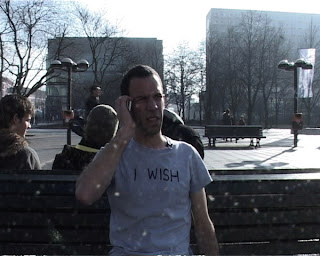IMF/DB Karþýtý Protestolar - 6 Ekim
gönderen: bbm Tuesday, Oct. 06, 2009 at 12:50 AM
IMF/DB toplantýlarýna karþý kitlesel protestolar bu sabah baþladý. Ýstanbul Indymedia da geliþmeleri anlýk biçimde iletmeye çalýþacak.
17:00 Direnistanbul Barbaros Bulvarý'ný kesti. Eyleme coplarla saldýran polise direnen Koordinasyon, polisin attýðý gazdan bir kiþinin öldüðü haberi alýnca "Katil Polis" sloganlarýyla eyleme devam etti. Polis çekilmeden yolu açmayacaklarýný bildiren Dienistanbullular polis çekildikten sonra yolu açarak eylemlerini bugünlük bitirdiler.
15:30 Direnistanbul Koordinasyonu'nun eylemi Beþiktaþ Çarþý'da devam ediyor.
14:45 Direnistanbul Koordinasyonu, Kongre Vadisi önünde gerçekleþtirdiði ve yaklaþýk 45 dakika süren eyleminden sonra Maçka istikametine doðru yürümeye baþladý.
14:35 Direnistanbul grubu kongre binasýnýn giriþine ulaþtý. Koordinasyon "Direniþin Ritimleri" grubunun eþliðinde sloganlarla zirveyi protesto ederken, grup polis tarafýndan çembere alýndý. Çemberin dýþýnda da destekçiler birikiyor.
14:20 Yeniden toplanan Direnistanbul Koordinasyonu, Kongre Vadisi giriþinde samba grubunun eþliðinde protestoya baþladý.
13:20 Fýndýklý ve Cihangir'deki çatýþmalarýn azaldýðý ve gruplarýn baþka yönlere daðýlmakta olduðu bildiriliyor.
12:50 Taksim'in ardýndan daðýlan protestocular Gümüþsuyu, Ýstiklal Caddesi ve Cihangir yönlerine doðru yöneldiler. Yer yer çatýþmalar yaþandý. Medyaya göre Taksim civarýnda 100'den fazla gözaltý var. Fýndýklý ve Cihangir civarýnda çatýþmalar olduðu söyleniyor
11: 35 Polis -ayrým gözetmeksizin- Taksim'de bulunan tüm gruplara yönelik gaz bombalý çok yoðun bir saldýrý baþlattý ve hemen hemen tüm gruplar daðýldý. 200-300 kadar gaz bombasýnýn atýldýðý bildiriliyor. Pangaltý'nda 8 kiþinin gözaltýna alýndýðý bilgisi veriliyor. Beyoðlu'nda çatýþmalar devam ediyor.
11: 20 Direnistanbul 200 kiþiyi aþan bir grupla Ýstiklal Caddesi'nden Taksim'e doðru ilerliyor. Þu an, Direnistanbul'un önünde ise Taksim'e girmeye hazýrlanan Kara Blok bulunuyor.
10: 35 DÝSK, KESK, TMMOB ve TTB tarafýndan saat 11:00'de Taksim'de gerçekleþtirilecek kitlesel protestoda Direnistanbul, IMF ve Dünya Bankasý Karþýtý Birlik vb. gruplar da yer alacaklar.
Bu amaçla biraraya gelen Direnistanbul Koordinasyonu saat 10:00'da Tünel Meydaný'na buluþtu; katýlýmcýlarýn sayýsýnýn 200 civarýnda olduðu bildiriliyor.
http://istanbul.indymedia.org/news/2009/10/258393.php









